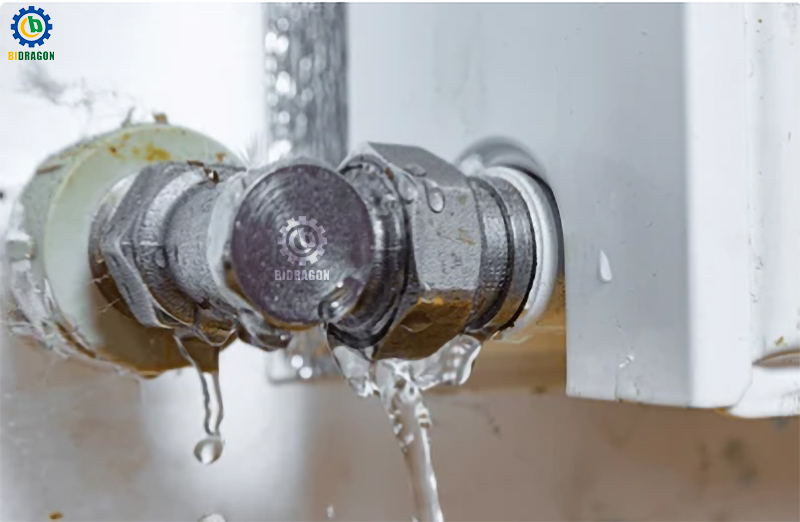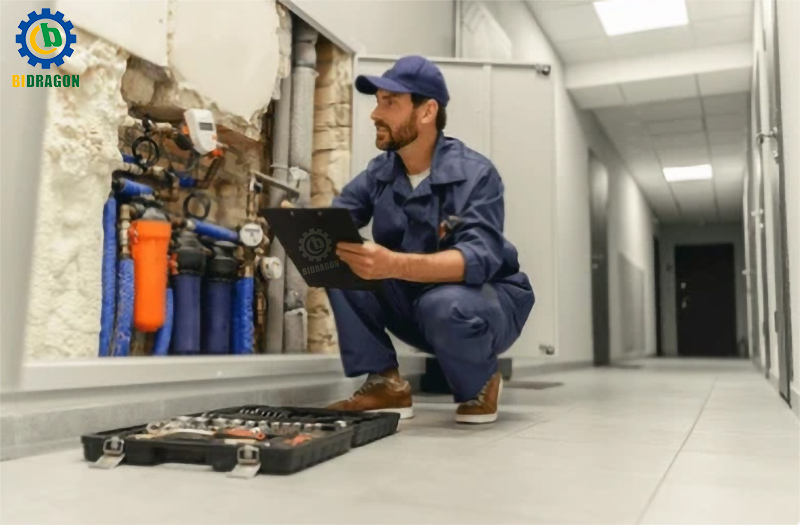Industrial boiler leakage response strategy: accurate investigation and efficient repair guide
Industrial boilers are the core equipment of many manufacturing enterprises, and their operation status is directly related to production efficiency and safety. Once there is a water leakage problem, it will not only cause energy waste, but also may lead to equipment failure, and even jeopardize the life safety of operators. In this paper, we will analyze the industrial boiler leakage identification methods, common causes, to provide a comprehensive repair program to help enterprises properly deal with this common problem, to ensure smooth and orderly production.
Accurately identify signs of industrial boiler leakage is the key to timely repair. Unlike household boilers, industrial boiler leaks may occur in various parts of the piping, valves, pressure relief systems, etc., and are not easy to visualize. The most obvious feature is the appearance of water stains or pooling at the bottom and around the boiler; if there is no obvious pooling, rusted pipes, steam leaks, or broken insulation on the outside of the boiler are also potential clues to a leak.
In addition, companies can monitor water meters and energy consumption data to determine if there is abnormal water consumption. If there is a sudden increase in water consumption, it is likely that a component of the boiler system is leaking, resulting in water loss.

Industrial boiler leakage is usually related to the damage or aging of key components, the common causes are as follows:
In the industrial boiler system, the pump bears the important task of continuous circulation of water to ensure the normal operation of the system. As the pump needs to operate for a long time under high load, by the high temperature and high pressure, seals and valves are very easy to wear and tear, which in turn triggered the leakage. If the pump leaks, usually by re-sealing or replacing damaged parts for repair.
Boiler system piping for a long time to withstand high-temperature and high-pressure water flushing, after a period of time, the connection and welding points are prone to corrosion, aging phenomenon. Corroded pipes will not only lead to water leakage, but also reduce the thermal efficiency of the boiler, and even cause more serious failures. For seriously corroded pipes, the most effective way is to replace the damaged part and ensure the quality of the installation.
The pressure relief valve is an important safety device for industrial boilers to prevent excessive system pressure. However, if the valve is not cleaned due to scale buildup or for a long period of time, it may fail. When the boiler pressure exceeds the safe range, the valve is unable to release the pressure in time, which can lead to water leakage. Therefore, regular inspection and cleaning of the pressure relief valve is an important measure to prevent water leakage.
Long-term operation of industrial boilers, if the water quality is poor or improper water treatment, boiler internal and piping is very easy to form scale, corrosion. This corrosion will not only cause water leakage, but also reduce thermal efficiency, damage to key components. Regular maintenance of the boiler water treatment system to ensure good water quality can effectively reduce the corrosion problem.
Once suspected industrial boiler leakage, the first task is to ensure the safety of the operator. The boiler should be immediately cut off the power supply, to be cooled to a safe temperature before checking. High temperatures and electrical equipment may be present around the boiler in an industrial environment, and all operations must follow strict safety protocols.
Next perform a detailed visual inspection, focusing on the bottom of the boiler, piping connections, pressure relief valves and other areas, looking for signs of water damage, rust or moisture. Because industrial boiler piping systems are large and leaks can be hidden, all joints and valves need to be carefully inspected.
Also, check that the boiler pressure gauge and safety valve are working properly. If the pressure appears abnormal (too high or too low), it could mean that there is a leak or other system malfunction. By recording pressure changes, it helps to accurately determine the source of the problem.
After an industrial boiler leaks, timely and effective repair is crucial. For different causes of water leakage, short-term and long-term solutions are different. The correct repair not only ensures the safe operation of the boiler, but also extends the life of the equipment and reduces production interruptions and maintenance costs.
Short-term repair is mainly for small leakage problems or emergencies, aimed at quickly solving the leakage, so that the boiler will resume operation as soon as possible.
Short-term repair can only solve the immediate problem, to avoid recurring leaks, long-term solutions are needed to fundamentally repair and improve the performance of the boiler system.
Once the industrial boiler leakage, not only waste of energy, affect production, but also may cause safety accidents. The key to preventing water leakage is to identify the risk in advance, regular maintenance to protect the overall health of the system. Here are some practical preventive measures:

If the industrial boiler leakage problem occurs repeatedly, and can not be solved by conventional repair, you should immediately contact a professional boiler repair company. Professional technicians can analyze the boiler system operating conditions through detailed diagnosis, identify the root cause of the leakage, and provide professional repair solutions. In some cases, severe corrosion or damage to the boiler may require replacement of the entire system, which requires an experienced team of technicians to handle.
Choosing a professional service company not only ensures the quality of repairs, but also improves the safety and operational efficiency of the equipment and avoids economic losses due to prolonged downtime.
Although industrial boiler leaks are relatively common, as long as timely diagnosis and professional repair, you can effectively avoid large-scale damage and production interruption. Regular maintenance, high-quality water treatment system and timely technical support is the key to ensure the long-term stable operation of the boiler. If a boiler leak occurs, it is important to take appropriate short- and long-term remedial measures and seek professional help when necessary to ensure equipment and production safety.